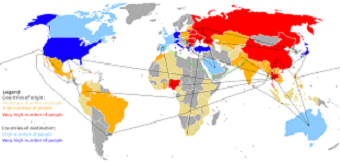Today, U.S. Embassy Zambia’s Chargé d’Affaires Linnisa Wahid and Minister of Home Affairs the Honorable Jack Mwiimbu signed the U.S.–Zambia Partnership to Prevent Trafficking in Persons (P2P), a new multi-year initiative to combat trafficking in persons in Zambia.
Implementation of this jointly developed program will strengthen the efforts of the Zambian government as it works with national stakeholders and civil society organizations to deepen a more sustainable, comprehensive, and coordinated response to human trafficking.
The P2P signing comes after several months of discussions between representatives of the Government of Zambia, the U.S. Department of State’s Office to Monitor and Combat Trafficking in Persons (TIP Office), and the U.S. Embassy in Zambia.
With the signing of this P2P – the first globally — the TIP Office provided $4 million in U.S. foreign assistance to Save the Children, which will collaborate with relevant Zambian government ministries and the TIP Office to implement an action plan developed to achieve the objectives of the P2P. These objectives include:
– Promoting coordination across relevant ministries, civil society, local communities, and foreign counterparts;
– Providing protection services that are readily accessible to adult and child trafficking victims using a trauma-informed and victim-centered approach; and
– Ensuring justice-sector actors utilize existing trafficking-specific legal frameworks to identify human trafficking victims, investigate cases, and prosecute and convict perpetrators of human trafficking in a victim-centered and trauma-informed manner.
Trafficking in persons” and “human trafficking” are umbrella terms—often used interchangeably—to refer to a crime whereby traffickers exploit and profit at the expense of adults or children by compelling them to perform labor or engage in commercial sex. When a person younger than 18 is used to perform a commercial sex act, it is a crime regardless of whether there is any force, fraud, or coercion involved.
The United States recognizes two primary forms of trafficking in persons: forced labor and sex trafficking. The basic meaning of these forms of human trafficking and some unique characteristics of each are set forth below, followed by several key principles and concepts that relate to all forms of human trafficking.
More than 180 nations have ratified or acceded to the UN Protocol to Prevent, Suppress and Punish Trafficking in Persons (the UN TIP Protocol), which defines trafficking in persons and contains obligations to prevent and combat the crime.

